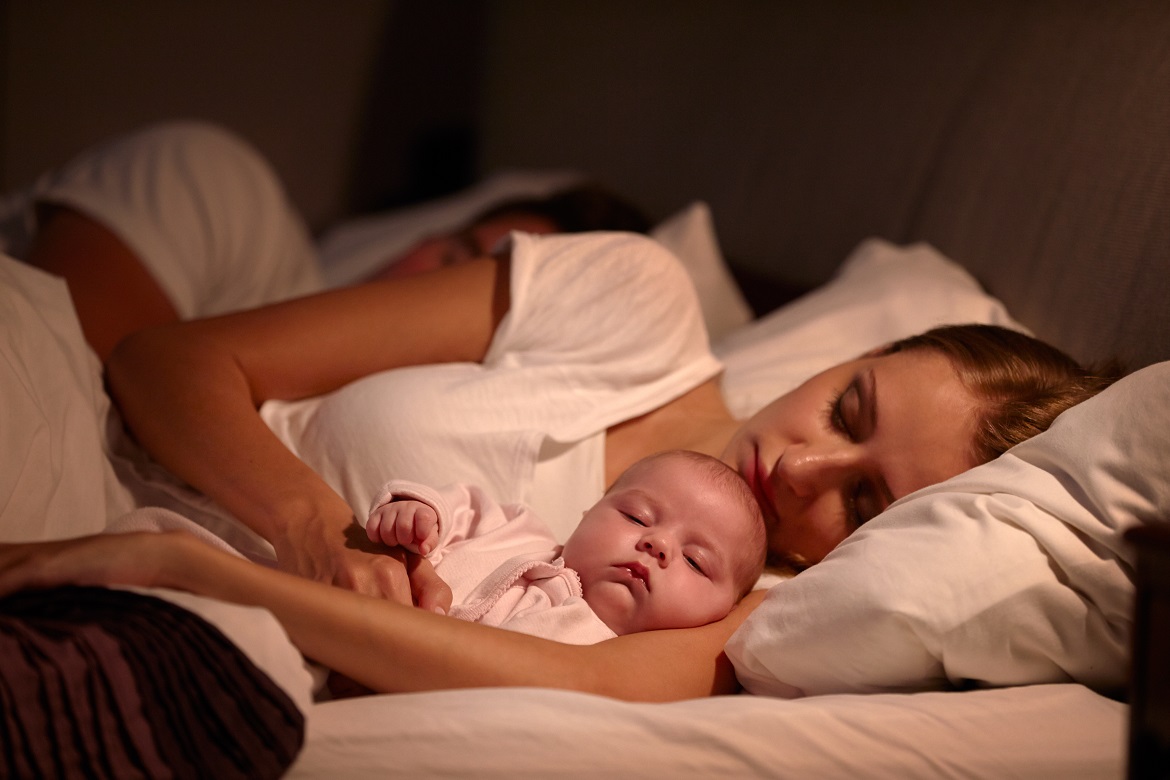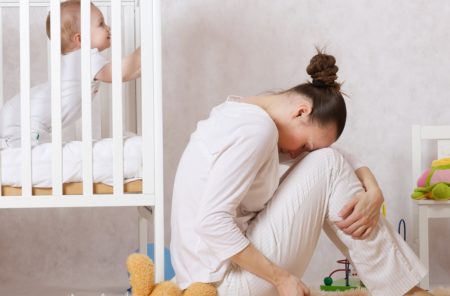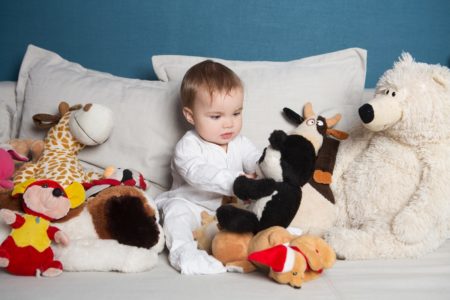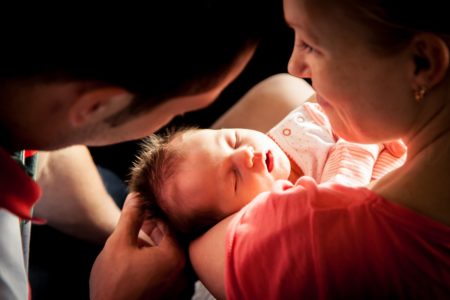They saythat there are parents who share beds with their children and those who don’tadmit they do. Question: why don’t they? Why is co-sleeping such acontroversial subject?
Let me getthings straight: I’m not going to convince anyone to co-sleep or not. In eachfamily the situation is different as are the children, parents, and theirneeds. What is an excellent solution for one home, in another becomes a sourceof problems. But such choices should be made consciously. That’s why I’d liketo take a look at the most common objections that parents have againstco-sleeping.
First,let’s discuss what it actually means to co-sleep with children. There areseveral commonly practised variants of family sleeping.
1. Parents in their bedroom and theirchild in a different room of their own.
2. Parents in their bedroom and thechild’s bed near their bed.
3. The infant sleeps in a bed designedto be set next to the parents’ bed (sidecar arrangement) – there are two beds,but they’re not separated by a rail etc.
4. The child falls asleep in their ownbed, but sooner or later during the night they end up in the parents’ bed.
5. The baby sleeps the whole night inone big bed with parents.
6. The child sleeps with one of theparents (most often with the mother), while the other parent sleeps separately- alone or with an older child.
7. A whole room is adapted for a largebedroom with a lot of sleeping room (e.g. mattresses placed next to each other)and everyone, parents and children of different age, sleep together.

I’m sure you’llagree that’s a lot of options. In reality, there are even more – in a lot ofhomes the night is the time of migration between beds and couches. It’s also a continuousdilemma: whose needs are the most important this night? At the moment shouldthe child have the best possible conditions? Or should the mother regenerateher strength? Perhaps dad should get some sleep, because of an important taskin the morning? Or maybe parents should spend some time with each other?
Whendeciding whether we should sleep together or separately, consider the opinionsof experts and experienced parents.
Infantsand toddlers need closeness
When achild is born to the world, they leave the mother’s warm, safe womb. It was ahot, cramped and moist place, where blood whooshed in veins and air in lungs,and where muffled voices of parents could be heard. After the birth, everythingis different: an infant’s world is empty, spacious and quiet. “I want thatfeeling of safety to come back,” we could translate the child’s crying, whenthey’re still fussing even though they are fed and changed. No wonder they wantto be close to their parents. The contact with mum’s or dad’s body soothesthem, the child’s heartbeat and breathing slow down, muscles relax and thelittle one falls asleep. They can smell the familiar scents of their mother andbreast milk, hear the rhythmic breathing, warm with her body’s heat.
As allother mammals, a child needs to be close to their parents. Although mostreptiles are on their own after hatching (a lizard goes looking for food rightafter leaving the egg), newly born mice, cats, rabbits or apes need theirmothers. A human child is completely helpless alone. Pregnancy takes 9 monthsand ends when the child can survive outside the mother’s system, but only ifshe takes care of them. (If it was longer, the child would be more developed,but too large for a natural birth). Not surprisingly, the baby wants to be surethat mom is always nearby.

Sleepingin the same room is safer
There is anaffliction every parent fears. The “Sudden infant death syndrome” (SIDS), alsoknown as sudden unexpected infant death (SUID). It’s a rare situation when asupposedly healthy infant stops breathing while asleep. Medicine is stillunable to fully explain this phenomenon and research is based on case studiesand statistics. One thing was determined successfully – sleeping positionmatters! Infants should sleep on their back because it’s safer. However,studies don’t give a clear answer on co-sleeping. If we look at Asia, wherebed-sharing is commonplace, we’ll notice that SIDS occurs there more rarelythan in the West (look here for information on Thailand). American paediatricians adviseparents against sleeping in the same bed with children until they are at least6 months old. At the same time, they emphasise that sleeping in the same roomlowers the risk of SIDS by 50%! (American Academy of Paediatricsrecommendations)
Parentswho smoke should not co-sleep
All thestudies on co-sleeping clearly show sleeping close to a child is dangerous andinadvisable if both or either parent are smokers. And it’s not about smoking inthe bedroom – hopefully no-one does that – but about the presence and breath ofsuch people.
If parentstake their child to their bed, they mustn’t be under the influence of othersubstances that impair awareness, such as alcohol, drugs, psychoactive drugs.Sober parents intuitively put children in the bed in a way that offers maximumsafety. But those “who’ve had one” – don’t.
Sleepingclose is good for nursing
Evenopponents of co-sleeping admit that having a child close makes nursing easier.Obviously, it’s much easier to feed the baby while dozing in your warm bed as theyeat, than endure the uncomfortable armchair next to the cot and then pray thechild won’t wake up when you put them down on their mattress. Instead of writingwhy it’s easier, I’ll show you an example of what a family experienced. Theparents decided to note down every feeding, activity and nap their child hadbetween the third and seventeenth month. Blue denotes sleep, green – nursing.
As you cansee, in the first months the mother who feeds only away from bed wasn’t goingto get much sleep…

In somecultures everyone sleeps together
In ourworld people sleep in their rooms, in separate beds. But it’s not the only wayof sleeping. In a lot of cultures, both nowadays and in the past, people have slepttogether. For the Japanese, the American or French custom of putting childrento bed in a separate room is simply impossible to comprehend. So if parents areafraid to co-sleep with their children because “they shouldn’t,” they can stopworrying. There is no such thing as “it shouldn’t be done.” Some do it, somedon’t. That’s all.
If achild shares bed with their parents, the bed must be adapted
Let’s saythat parents decide to try and sleep with their child in the same bed. Whatthings should they pay attention to?
- themattress must be firm;
- the bedmust be wide and spacious;
- therecan’t be any pillows or heavy duvets in the bed and each parent needs their owncover;
- sidesshould be secured to avoid the baby falling off the bed.

Bothparents should agree on the chosen solution (or find a compromise)
Beforedeciding what your nights look like, discuss the subject. Early parenthood isthe time when emotions flare. It’s easy to harm another person, make them feelunneeded, unwanted. The child is important, but so are you. The baby needs twoloving parents, who feel happy and accepted by each other.
Whatabout sex?
Someparents are anxious that when the child moves into their bed, it will mean theend of sex life. To this I’ll say: I’ve once found a thread on an Internetforum that concerned that subject. When I read where the parents whose childrenclaimed their bed make love, I concluded that it might actually put a sparkinto the relationship…
Are theyever going to leave?
The lastcommon anxiety goes like this: “If we start co-sleeping, they’re never gonnaleave the bed.”
First ofall, children who slept alone since birth also sneak into parents’ bed, it’snormal and understandable. Moreover, it’s also very cute.
Secondly – thisargument can be interpreted this way: “if you once show a child that they canfeel safe and good with us, they’ll always want to feel like that” – Rememberthat children grow up. Their needs change, or the way they fulfil them changes.An infant wants to be close to their mum, because they know they’ll survive. A4-year-old will be happy when their dad reads them a goodnight story, gives ahug, count all the stars in the sky… Then they’ll happily march to their ownbed. A child brought up in closeness knows, even when asleep, that parentswatch over them, even if they’re in another room.













